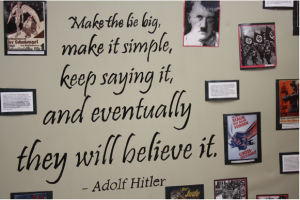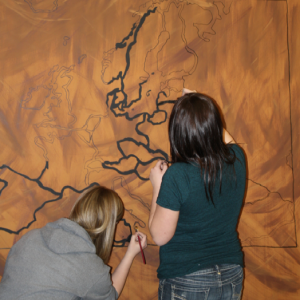
This past school year, Shelley Wright, a high school educator in Moose Jaw, Saskatchewan, made a number of big changes in her teaching practice. The class went paperless and used a Wiki, she incorporated project-based learning and collaboration into her lessons, she experimented with "vessays." All along the way, she documented everything on her blog Wright's Room -- not just operational information, but how those changes affected her view of learning and her relationship with her students.
It took a lot of courage on Wright's part to just jump in with these new practices. Since her blog already reflects her own opinions about the changes, I wondered what her students and the students' parents felt about them. I asked Wright to send out a query, and here's what we learned.
First, here are some responses from students about the class's built-from-the-ground-up Holocaust Exhibit, the epitome of project-based learning.
- "It was a great experience for me to learn different kinds of work. For example, painting, sewing, sound system, and working with different peers each day. I think that I could learn as much from a textbook but it for sure wouldn't be a fun and enjoyable way of learning. Before this, I thought that learning and school was that you sat in a desk for the day and wrote paperwork and math equations and different types of exams. I see now that school subjects can be taught in a more unique, fun, and enjoyable way for the students. It will help the students think positive about school and they will want to come and learn."
-

Students work on the Holocaust exhibit. "We were given the opportunity to go into any aspect of the holocaust. We weren't told to study certain things and had limits on what we wanted to learn. People just went into what interested them most. I wouldn't have been able to learn as much as I did if we were only using textbooks. Sure, they put the important 'stuff' in there everybody needs to know, but with the Internet, anybody can put things on it. So you can research anything and somebody will have something about it. Like, who would have thought that not only the Jews had stars. I definitely see learning differently after that project, because during the entire project I was kinda my own teacher. I wanted to know about something, I researched it and I was able to teach others what I learned and vice-versa. Usually I learn things only for the test and then after that, it's out of my mind two days later. But for this, what I learned doesn't get out of my head, because it's all things that interested me and I actually wanted to learn."
- "Suddenly the information wasn't just information - they were real stories - this project has made a lasting impression for me. Before [this project], learning consisted of novel studies -- reading a book and answering comprehensive questions. During this project we read novel(s), then got into groups and researched what we were interested in learning more about (compiling our information onto a shared Google Doc) and finally as a class we came up with a way to present everything we'd learned. It was a great experience and opportunity."
- "Not only did I get to show my work, but people got to see the talents I have. I think it’s easier to pay attention to people than a book. Also, I couldn’t rely on the teacher anymore, I had to rely on myself and my classmates; which is a lot harder than you think."
And some thoughts about Wright's paperless, collaborative Wiki system:
- "Not only do I get to see my opinion, but I get to see others as well. I usually have a hard time answering questions, so seeing opinions from other people can be very helpful."
- "I like how you can go and see what your peers have written and collaborate from that and make it better. I also like how we're not sitting in a classroom writing on a piece of paper but actually having class discussions about the questions and answers in class. I wish that I could change how some of the students didn't choose to go and write answers on the wiki and left it for the students who were answering every time."
- "It improved our team working skills and it was just really cool to work with! I loved that everybody could put their own thoughts into one thing and others could read what the others were thinking. Because some people think differently than others and view situations differently. What I didn't like about it was that around the middle, people stopped posting and left it up to other people."
- "The thing that I liked about it most was that I could access my work pretty much 24/7. We all know that teachers have a life outside of school but that doesn't mean that they don't work on school-related things. With the online wiki, if Mrs. Wright posted something new over the weekend I could start working on it asap, regardless if it was during school hours which I really liked. I wish that every class could have a wiki."
A couple of parents also weighed in about how Wright's changes seemed to affect their kids. A few quotes below:
- "[My daughter] has really enjoyed working in this way and is excited about her projects. I think it makes her feel her high school assignments are more on par with post secondary work than middle to elementary school projects, using these techniques. It also gives her a feeling of maturity and preparation for the last years of high school and gives her a look through the window at the work skills required in any post secondary studies she may pursue."
- "I think the most powerful thing [my daughter] experienced was the Holocaust museum, and the great deal of work it took to create it. Every night at dinner we’d have an updated progress report, sometimes successes, sometimes frustrations. We noticed that she would put in many long hours researching and creating her parts of the museum. She was also very excited about presenting her work to the public."
These comments prove to me that the hard work and perseverance Wright poured into her class have been incredibly fruitful. She's made herself vulnerable, taken risks, and trusted her students -- a true sign of a fearless teacher.
